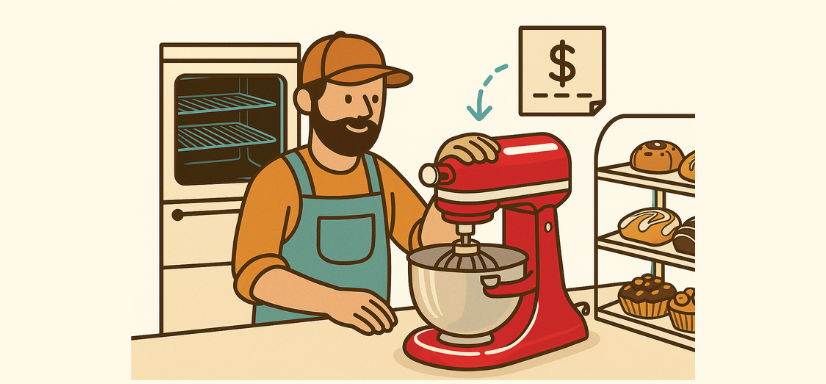Essential Bakery Equipment List: 20 Items Needed to Start a Bakery
Looking to start a bakery business? Need a list of essential bakery equipment like ovens and dough prep equipment? Get started with our comprehensive guide!

Starting a bakery requires more than just great recipes. Equipping your kitchen with the right tools is critical for ensuring consistent quality, efficiency, and food safety. Whether you’re launching from home or setting up a commercial space, this guide breaks down the must-have bakery equipment by production phase to help you build your dream setup.
- Prep: scales, mixing bowls, measuring tools
- Baking: oven (preferably commercial-grade), baking sheets, pans
- Frosting & Finishing: spatulas, piping bags, timers
- Packaging: labels, boxes/containers, storage racks
In this comprehensive guide, we’ll explore a list of 20 essential bakery equipment items, delve into the reasons why each is crucial for your business, and provide approximate costs (in USD for 2025) to help you plan your bakery setup effectively.
Ensure your bakery inventory is under control!
Discover how Craftybase bakery software can effortlessly streamline your production, track ingredients, and boost profitability. It's your bakery business' production central.
🍲 Prep & Measuring
Before any dough is mixed or batter is poured, preparation is key. This is the stage where accuracy makes all the difference—too much flour or a smidge off with the sugar and you’re in trouble. The right prep tools don’t just make your process smoother; they help reduce waste and ensure your bakes are consistent every time. Trust us, this part is worth getting right.
Digital Kitchen Scale
Accurate weighing is essential in baking. A digital scale helps maintain recipe consistency and prevents overuse of ingredients.
💵 Price Range: $10–$40
Where to Buy:
Mixing Bowls (Stainless Steel)
Durable and easy to clean, stainless steel bowls are versatile for mixing, whipping, and proofing. You’ll want a few in different sizes to rotate through quickly when things get busy.
💵 Price Range: $20–$60
Where to Buy:
Measuring Cups & Spoons
Standardized measuring tools help ensure consistency across all recipes. Plastic might work in a pinch, but a sturdy metal set will last and won’t warp in the dishwasher.
💵 Price Range: $10–$25
Where to Buy:
Whisks & Spatulas
Essential for mixing, folding, and scraping batters cleanly. A flexible spatula saves every last bit of batter, and a good whisk helps aerate for fluffier results.
💵 Price Range: $10–$30
Where to Buy:
🔥 Baking & Cooking
This is where the magic happens. Reliable baking gear is key to turning your carefully prepared dough into something golden, crisp, or perfectly chewy. Invest in durable, high-quality tools now and your future self will thank you.
Silicone Baking Mats
Reusable and non-stick, silicone mats reduce waste and help with even baking. Plus, no more wrestling with parchment paper that curls up at the worst moments.
💵 Price Range: $15–$30
Where to Buy:
Commercial-Grade Oven
A must for any serious bakery. Offers better heat distribution and consistent results. If you’re planning to scale, don’t skimp here—this is the workhorse of your kitchen.
💵 Price Range: $2,000–$10,000+
Where to Buy:
Dough Sheeter
If you’re working with laminated doughs or need to roll doughs to consistent thickness at scale, a dough sheeter is a game-changer. It saves time and gives you that perfectly even finish that hand rolling just can’t match.
💵 Price Range: $2,000–$6,000
Where to Buy:
Proofing Cabinet
Keep your dough at the perfect humidity and temperature for consistent fermentation. Especially useful in cooler kitchens or for scaling sourdough production.
💵 Price Range: $1,500–$5,000
Where to Buy:
Baking Sheets & Pans
Versatile for cookies, pastries, and more. Go for heavy-duty, non-warping pans with rolled edges—they’ll last longer and heat more evenly.
💵 Price Range: $15–$50
Where to Buy:
Cooling Racks & Oven Mitts
Cooling racks help your baked goods finish properly without soggy bottoms, and mitts protect your hands when the heat’s on. Don’t underestimate the value of these small-but-mighty tools.
💵 Price Range: $10–$30
Where to Buy:
🍰 Frosting & Finishing
This phase is all about presentation. It’s where your baked goods go from tasty to totally irresistible. A few key tools here can elevate the look of your final product and save you loads of time decorating.
Offset Spatulas & Bench Scrapers
Perfect for getting those clean cake edges or smoothing out layers of frosting like a pro. A bench scraper also doubles as a handy tool for dough dividing.
💵 Price Range: $10–$25
Where to Buy:
Piping Bags & Decorating Tips
Whether it’s rosettes, borders, or a simple swirl on top of a cupcake, a good piping set is your secret weapon for beautiful bakes.
💵 Price Range: $10–$35
Where to Buy:
Timers & Thermometers
Good timing and proper temperature are everything in baking. Thermometers help avoid under- or overbaking, and timers keep your kitchen workflow on point.
💵 Price Range: $15–$100+
Where to Buy:
🛋️ Packaging & Storage
Last but not least: the final handoff. How you package and store your goods impacts both freshness and presentation. These tools also help keep your kitchen tidy and your inventory organized.
Food-Safe Boxes & Labels
First impressions count. Packaging that’s both food-safe and attractive helps your brand shine, especially for markets and deliveries.
💵 Price Range: $10–$50
Where to Buy:
Storage Bins & Racks
Nothing slows you down like a cluttered workspace. Sturdy bins and shelving keep ingredients visible and accessible—key for staying on top of orders.
💵 Price Range: $20–$100+
Where to Buy:
Tracking Your Bakery Equipment Inventory
Efficient bakery management goes beyond producing mouthwatering treats – it involves meticulous tracking of both ingredients and equipment. In this section, we’ll explore why keeping a close eye on your bakery’s inventory is crucial and introduce Craftybase as a powerful software solution to simplify the process, ultimately enhancing your bakery’s overall efficiency.
Read more: Complete Guide to Raw Material Inventory Management →
Why It’s Important to Track Both Ingredients and Equipment
Let’s firstly cover a couple of points about why it’s important to know what you have on hand in your bakery.
1. Preventing Wastage:
Effective inventory management helps prevent unnecessary wastage of both ingredients and equipment. As bakery businesses deal with a lot of materials with use-by dates that need to be adhered to, by knowing exactly what you have in stock, you can minimize the risk of expiration, saving both money and resources.
Read more: How to Track Batch & Lot Numbers →
2. Ensuring Adequate Supplies:
Tracking ingredients ensures that you always have sufficient supplies to meet demand. Running out of a crucial ingredient can disrupt production and lead to customer dissatisfaction. Similarly, monitoring equipment levels helps you anticipate maintenance needs and avoid unexpected breakdowns.
Read more: A Guide to Production Planning & Scheduling →
3. Maintaining Quality Control:
Consistency is key in the baking industry. By meticulously tracking both ingredients and equipment, you can maintain the quality of your products. This is especially vital for bakeries with signature recipes and distinct flavor profiles.
Read more: Best Practices for Managing Your Inventory →
4. Streamlining Operations:
A well-organized inventory system facilitates smoother day-to-day operations. Knowing where each ingredient and piece of equipment is located reduces time spent searching, allowing your bakery staff to focus on what they do best – creating delicious treats.
Read more: Getting Started With Your Inventory →
5. Planning for Growth:
As your bakery expands, tracking inventory becomes even more critical. Understanding consumption patterns and equipment usage helps you make informed decisions about scaling your business, whether it’s introducing new products or investing in additional equipment.
Read more: The Bakery Pricing Guide: Dough-n’t Sell Yourself Short →
Craftybase: Your Bakery Inventory Management Solution
Introducing Craftybase – a comprehensive bakery inventory management software designed to simplify the tracking of both ingredients and equipment. Craftybase offers a user-friendly interface and a range of features tailored to the unique needs of small-scale bakeries.
Ingredient Tracking: Craftybase allows you to monitor ingredient levels, set reorder points, and receive alerts when supplies are running low. This ensures you never run out of your essential baking components and you can keep those customers happy.
Equipment Management: Keep tabs on the condition and usage of your bakery equipment. Craftybase provides a centralized platform to log all of your bakery equipment.
Recipe Costing: Easily calculate the cost of each recipe by factoring in ingredient prices and equipment depreciation. Craftybase helps you understand the true cost of production, enabling better pricing strategies.
Sales Tracking: Link your inventory data with sales figures to gain insights into your bakery’s performance. Identify popular products, manage seasonal demand, and make data-driven decisions to maximize profitability.
Ready to Optimize Your Bakery Operations?
Sign up for Craftybase today and take the first step towards streamlined bakery inventory management. With Craftybase, you can focus on perfecting your recipes and delighting customers while leaving the complexities of inventory tracking to the experts.
⭐ Sign up for our completely free (no strings attached!) trial today →
Conclusion
In the dynamic world of baking, where precision and organization are paramount, tracking both ingredients and equipment is the cornerstone of a successful bakery operation. We hope this article has given you some insight on how much it costs to start your bakery and has given you a good understanding of why it’s important to track your bakery inventory - both raw materials and equipment. Happy baking!
Frequently Asked Questions
- 💬 Do I need a commercial oven?
✅ If you're producing large batches or scaling your business, a commercial-grade oven gives consistent results, faster bake times, and better heat control—worth the investment.
- 💬 What is the benefit of using a convection oven in a bakery?
✅ Convection ovens use fans to distribute heat evenly, resulting in baked goods that cook more evenly and quickly. This makes them an efficient choice for bakeries, especially when baking in large quantities.
- 💬 What should I consider when purchasing mixing bowls for my bakery?
✅ Consider the material, size, and durability of mixing bowls. Bowls should be sturdy and large enough to accommodate your most common recipes. Stainless steel is a popular choice due to its strength and ease of cleaning.
- 💬 Can I use restaurant equipment for a bakery?
✅ Yes, many pieces of restaurant equipment such as ovens, mixers, and pans are also used in bakeries. However, some bakery-specific equipment like proofers and doughnut fryers may be needed depending on your product range.
- 💬 What is a deck oven and how does it differ from a convection oven?
✅ A deck oven has a stone baking deck that heats up and gives a unique crispness and texture to baked goods. Unlike convection ovens, deck ovens do not use fans but rely on radiant heat and conduction, making them ideal for artisanal bread.
- 💬 What types of baking pans are best for a professional bakery?
✅ The best pans depend on what you're baking. Non-stick pans are great for cakes and pastries, while stone or cast-iron pans are better for breads and pizzas. Prioritize size, material, and durability.
- 💬 How can I organize my bakery equipment efficiently?
✅ Group tools by production phase (prep, baking, packaging) and store frequently used items within easy reach. Use labeled storage bins and vertical racks to maximize space.
- 💬 Does bakery packaging impact shelf life?
✅ Yes—proper packaging keeps baked goods fresher for longer. Use airtight containers or food-safe boxes to reduce moisture loss and prevent contamination.
